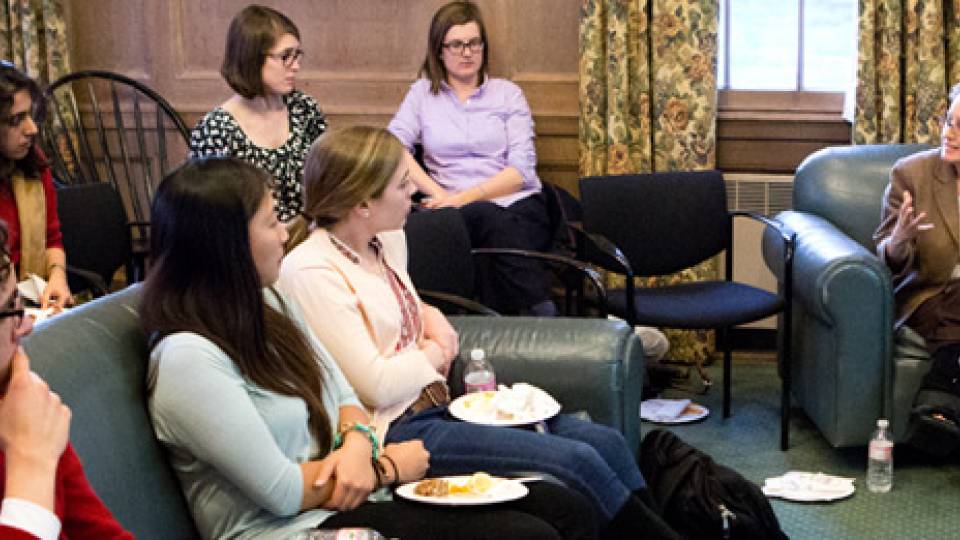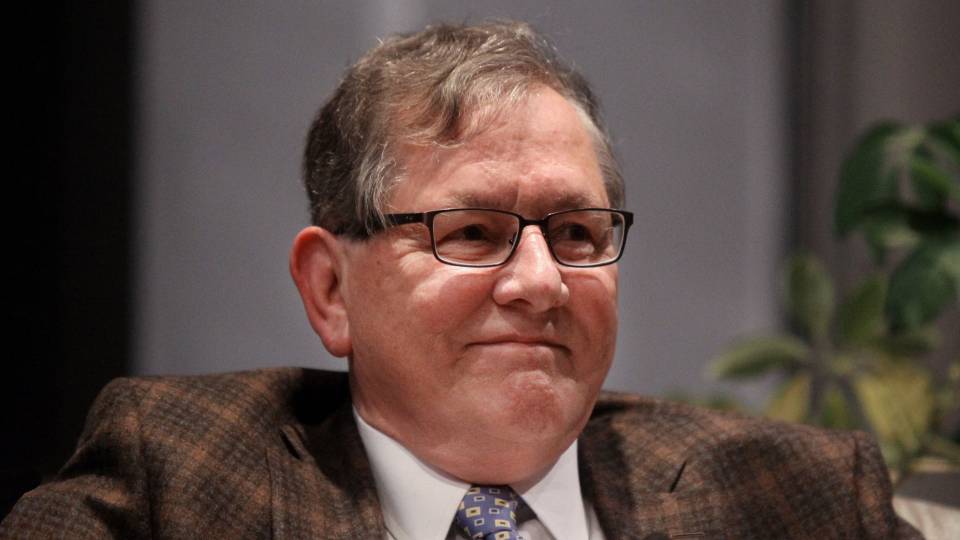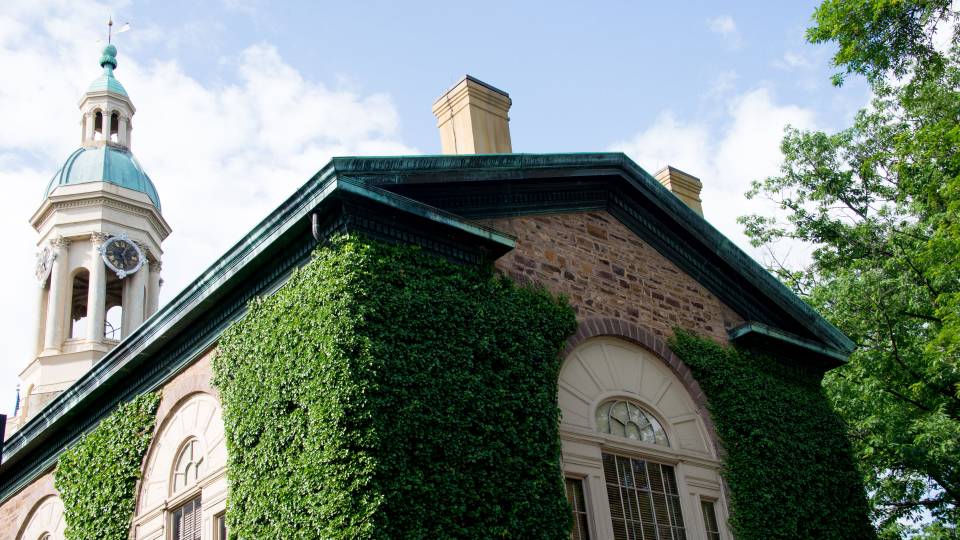Melissa Lane, the Class of 1943 Professor of Politics at Princeton and director of the University Center for Human Values, will give an extended series of distinguished public lectures at Gresham College in London over the next three academic years, with the overall title of “Reimagining Politics: Ideas, Selves, Futures.” Her talks continue Gresham’s 426-year-old tradition of delivering free public lectures for London audiences locally, and globally through livestreaming and online access.
Each year, Gresham College, a non-degree granting institution, presents multiple public lecture series by its 10 professors and several visiting professors from academia, the arts, law, medicine, politics and industry. Lane will have the title of Professor of Rhetoric, a non-teaching role, for the duration of her lecture series and will hold the appointment for a fixed term concurrently with her permanent Princeton appointment, as is the norm for Gresham Professors.
Lane is a specialist in ancient Greek political thought and the ethics and politics of climate change. Her latest book is “Of Rule and Office: Plato’s Ideas of the Political” (June 20, 2023, Princeton University Press). Her Gresham College lectures in 2023-24 will focus on “The Political Imagination: Ancient Greek Ideas.”
“As someone fascinated by the history of political ideas, the lineage of Gresham Professors sharing ideas for free with the public of London (and now the world) for over 400 years is one I am absolutely delighted and honored to join,” Lane said. “Rhetoric is an ancient Greek word for the practice of persuading through logos, ethos and pathos. Whether it is understanding the demands of political office or diagnosing why climate change is so hard to address, ancient Greek philosophers like Plato and Aristotle can help us to rethink the ideas we take for granted and so open the way to new political possibilities.”
“We are privileged to have appointed Professor Melissa Lane to be the 50th Professor of Rhetoric at Gresham College,” said Martin Elliott, a professor and provost of Gresham College. “She is an acknowledged expert on the political structures and ideas of ancient Greece, and she will compare and contrast those times with the rather challenging politics of the current era. She will remind us of the origins of political thought and institutions and make us think about what works and what does not. I can’t wait to hear her.”
Lane, who joined the Princeton faculty in 2009, has previously served as a University Senior Lecturer in history at the University of Cambridge and a Fellow of King’s College, Cambridge, as well as the Carlyle Lecturer at the University of Oxford.
She has published widely on political ideas and has received numerous awards, including a Guggenheim Fellowship, and visiting appointments at Harvard University, Stanford University and the École Normale Supérieure. She is also the author of “The Birth of Politics: Eight Greek and Roman Political Ideas and Why They Matter” (2015, Princeton University Press) and “Eco-Republic: What the Ancients Can Teach Us About Ethics, Virtue, and Sustainable Living” (2012, Princeton University Press) among others.
Bringing ancient Greek political ideas to contemporary issues
Lane’s lecture series in 2023-24 will explore the vocabulary of ancient Greek political ideas which lie at the intersection of rhetoric, philosophy, ethics and politics. The six ideas — political office, justice, equal law, democracy, expertise and the nature of social growth — are central to the organization of power and the values it might serve, she notes. By drawing on Greek literature, history and philosophy to articulate these ideas, and testing them against contemporary dilemmas such as climate change, the lectures will look to expand listeners' political imaginations.
The series includes:
Plato and the Idea of Political Office (Oct.19, 2023)
Plato’s Republic confronted the challenges of political office (archē). By working through the ideas of this dialogue and comparing them to the present day, the lecture offers a new way of understanding the role of officeholders and the ethical demands placed on them. It argues that Plato took the risk of abuse of power far more seriously than has been generally recognized.
Ancient Greek Ideas of Justice (Jan. 11, 2024)
In the poetry of the Athenian lawgiver Solon, justice (dikē) was a boundary stone marking out terms that rich and poor alike could respect. Yet ancient Greek authors also recognized the danger that the powerful will simply exploit those less powerful, and that Greek societies enforced slavery. This lecture explores ancient Greek aspirations to justice — and how they fell short — as a call for recurrent interrogation of the terms governing power and vulnerability.
Ancient Greek Ideas of Equality Under the Law (March 7, 2024)
The Nobel Laureate economist Amartya Sen has posed the question, “equality of what?” The value of equality depends on what standard is chosen. As ancient Greek thinkers recognized, equality can be deployed to exclude as well as to liberate, and its relationship to law and freedom needs to be interrogated. If equal social freedom is a product of isonomia — the equal application of laws to all — those laws need to be free of systematic bias and command public respect.
Democracy: Ancient Models, Modern Challenges (March 14, 2024)
Dēmokratia is the power (kratos) of the people (dēmos). But what kind of power, and who constitutes the people? Although ancient democracy is often stylized as “direct democracy” and so positioned as very different from modern “representative democracy,” in fact, issues of accountability are central to both. Ancient Greek models of holding leaders to account are still relevant. Furthermore, the ancient Greek use of election for some offices and lottery selection for others also offers instructive possibilities for modern challenges.
Experts in Politics: Lessons from Socrates and Aristotle (May 30, 2024)
Socrates sought to test the expertise (technē) of everyone around him: the bombastic know-it-alls, the bashful youths, the confident generals, those (including the enslaved) with unsuspected mathematical competence, the workaday artisans. Aristotle later explored the ways in which expert claims can be made credible to popular judgment. This lecture considers the role of experts in contributing to public debate in a democracy, bringing Aristotle's work on rhetoric to bear on norms for expert communication and public debate.
Plato’s Cave: Thinking About Climate Change (June 13, 2024)
In the Republic, Plato explores the predicament of the Cave: a passive citizen body, a conniving and self-interested set of sophistic opinion-formers and demagogic political leaders, a systematically misleading and damaging order of political structures and common beliefs and appetites. Does this have lessons for tackling climate change? In clinging to our current way of life and its fossil-fuel infrastructure, are we trapping ourselves in a modern version of Plato’s Cave — and if so, how might we escape?
The lectures will be livestreamed and freely available to view on Gresham’s website.





